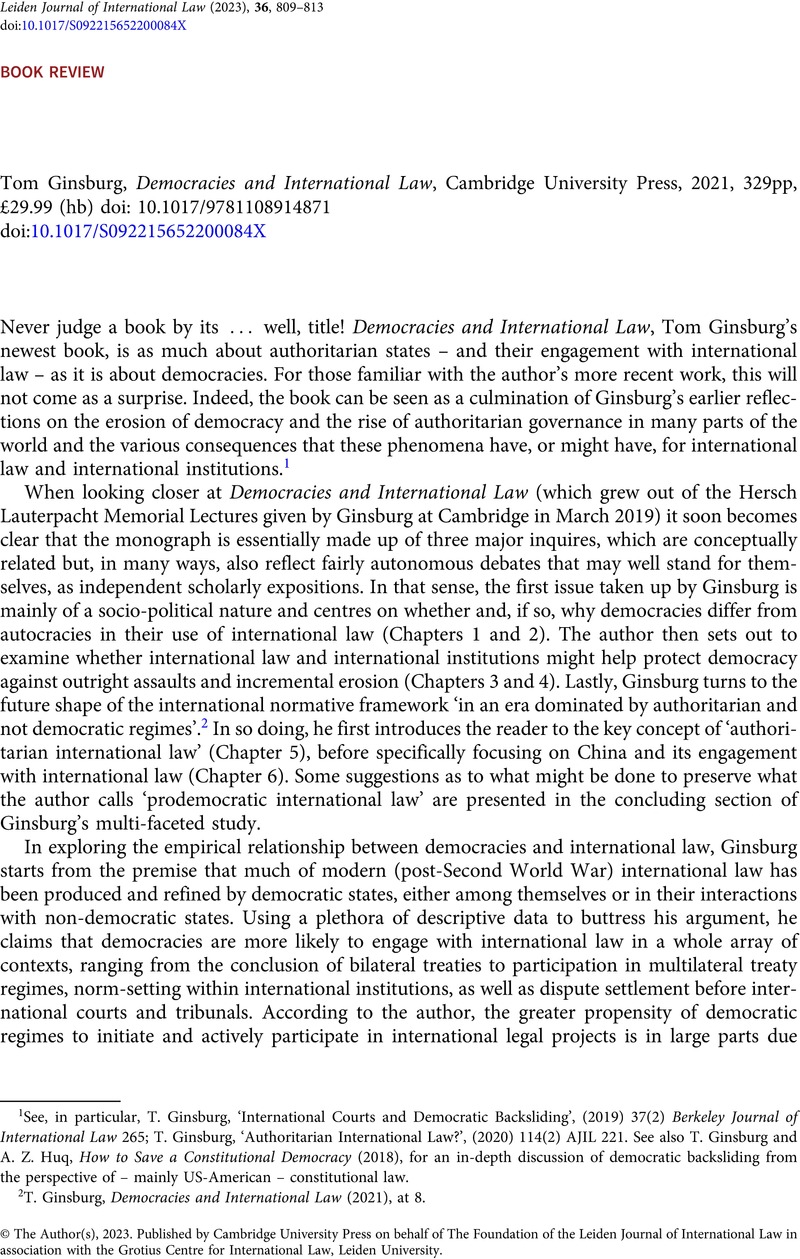No CrossRef data available.
Published online by Cambridge University Press: 17 February 2023

1 See, in particular, T. Ginsburg, ‘International Courts and Democratic Backsliding’, (2019) 37(2) Berkeley Journal of International Law 265; T. Ginsburg, ‘Authoritarian International Law?’, (2020) 114(2) AJIL 221. See also T. Ginsburg and A. Z. Huq, How to Save a Constitutional Democracy (2018), for an in-depth discussion of democratic backsliding from the perspective of – mainly US-American – constitutional law.
2 T. Ginsburg, Democracies and International Law (2021), at 8.
3 See ibid., at 39.
4 Ibid., at 40.
5 In an influential article, written at the height of the post-Cold War euphoria, Thomas Franck has postulated that democracy is increasingly becoming a ‘global legal entitlement’ protected by collective international processes. In laying out his argument (which, it should be noted, is clearly not shared by Ginsburg), Franck operated with a definition of democracy that was essentially restricted to the right of citizens to take part in periodic, free and fair elections; see T. M. Franck, ‘The Emerging Right to Democratic Governance’, (1992) 86 AJIL 46.
6 See Ginsburg, supra note 2, at 26.
7 See, for instance, I. Hurd, ‘Legal Games – Political Goals’ [‘Symposium on Authoritarian International Law: Is Authoritarian International Law Inevitable?’], (2020) 114 AJIL Unbound 232.
8 D. Landau, ‘Abusive Constitutionalism’, (2013) 47 UC Davis Law Review 189. See also R. Dixon and D. Landau, Abusive Constitutional Borrowing: Legal Globalization and the Subversion of Liberal Democracy (2021).
9 See, e.g., L. Di Bonaventura Altuve, ‘Collective Promotion of Democracy and Authoritarian Backsliding: The Organization of American States in Venezuela, Nicaragua, and Honduras’, (2021) 65 The Latin Americanist 233.
10 See, e.g., T. Drinóczi and A. Bień-Kacała, Rule of Law, Common Values, and Illiberal Constitutionalism: Poland and Hungary within the European Union (2021).
11 See Ginsburg, supra note 2, at 185.
12 Ibid., at 187.
13 As the author explains in detail in Ch. 6 of his study, Beijing’s current approach to international affairs is strongly influenced by traditional Chinese ideas of world order. Importantly, this includes the ancient concept of tianxia (‘all under heaven’), which – according to Ginsburg – may in fact be viewed as ‘the perfect underpinning of a notion of hegemonic international law with “Chinese characteristics”’. See Ginsburg, ibid., at 252.
14 See Ginsburg, ibid., at 236.
15 Ibid., at 237.
16 Though Ginsburg does not offer a detailed definition of the latter category (general or regime-neutral international law), he indicates that it pertains to international norms and arrangements that are meant to ‘facilitate the production of international public goods’ without any reference to regime-type. See Ginsburg, ibid., at 50.
17 See Ginsburg, ibid., at 286.
18 T. Ginsburg, ‘Democracies and International Law: An Update’, (2022) 23(1) Chicago Journal of International Law 1, at 4.
19 The operation’s objective was to quell mass protests in Kazakhstan provoked by a sudden increase in local gas prices. According to some observers, the episode has set a precedent for the use of the CSTO for internal repression in the post-Soviet space; see J. Hedenskog and H. von Essen, ‘Russia’s CSTO Intervention in Kazakhstan: Motives, Risks and Consequences, Stockholm Centre for Eastern European Studies’, 14 January 2022, available at sceeus.se/en/publications/russias-csto-intervention-in-kazakhstan-motives-risks-and-consequences/.
20 ‘Joint Statement of the Russian Federation and the People’s Republic of China on the International Relations Entering a New Era and the Global Sustainable Development’, 4 February 2022, available at www.lawinfochina.com.